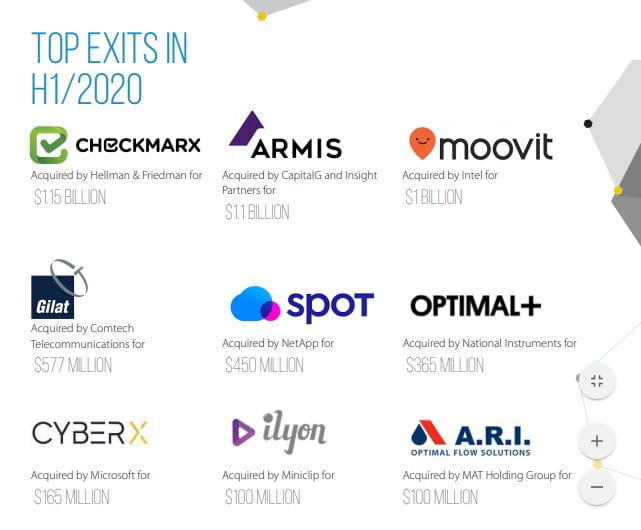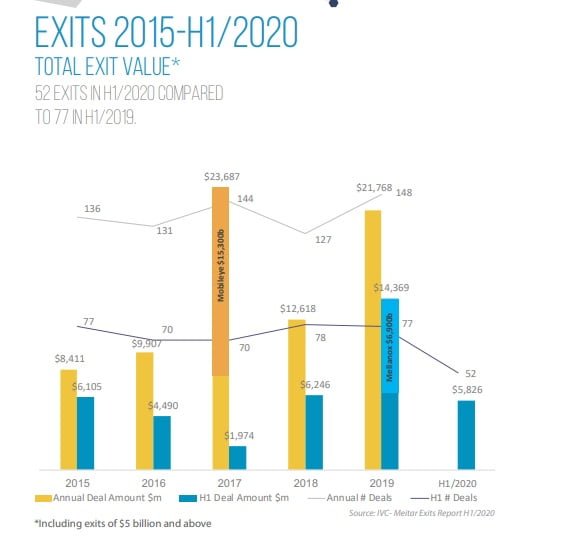Exits for Israeli startups and companies in the first half of 2020 hit a low of $5.82 billion in the wake of the COVID-19 pandemic, the lowest level in six years, according to a new report published on Wednesday by the IVC Research Center and Meitar Law Offices.
Between January and June 2020, there were 52 exits – including IPOs, M&As and buyouts – for Israeli companies, a decrease of 32 percent compared to 77 exits with a total value of $14.3 billion in the first half of 2019. This is the sharpest decline in the last six years, both in the number of deals and value (22 percent), the report noted.
The number of exits between $100 million and $5 billion for the first half of 2020 was also lower than the first half of 2019, with just nine such deals compared to 23 the year prior.
SEE ALSO: Israeli Companies Raise $2.5B In 170 Deals In Q2 2020 But Feel COVID-19 Impact

However, excluding transactions of $5 billion or more, the average deal value in the first half of 2020 rose to $112 million, the highest average value in the last six years. This figure was affected by three transactions of over $1 billion each, namely the acquisition of Checkmarx by global private equity firm Hellman & Friedman for $1.15 billion, that of IoT security firm Armis by NY-based Insight Partners for $1.1 billion, and that of transit data company Moovit by Intel for close to $1 billion.
In addition, despite the drop in total exit value for this first half of 2020, investments were at their highest in six years, with $5.2 billion raised in 312 deals in H1 2020, an average of $16.8 million per investment, according to the report. This is compared to $3.76 billion raised in 258 deals in the first half of 2019, averaging $14.5 million per deal.
In January-June 2020, there were 10 investment deals of over $100 million, the highest number of deals in for an H1 period since 2014. These included a $400 million funding round for Israel-founded transport firm Via, $210 million for AppsFlyer, the developer of a platform offering software-as-a-service mobile marketing analytics and attribution, and a $145 million investment in Israeli-founded cybersecurity firm BioCatch.
“Looking at the exit activity in the first six months of 2020, we see the substantial effect of COVID-19 bringing a significant decline in exits,” said Shira Azran, a partner at Meitar. “These results sit well with the general atmosphere among buyers in light of this crisis that the focus should be on protecting market share and revenues and preserving cash, rather than deploying capital on M&A.”
Sign up for our free weekly newsletter
SubscribeAzran said there is an expectation that the second half of 2020 will see a continuation of this downward trend in exits. On the other hand, many companies underwent growth processes even during the COVID-19 crisis, with specific sectors – such as digital health and fintech, flourishing, she indicated.

“That will hopefully be the basis for exits in future years. In addition, contrary to the exit activity in Israel, investment activity sends an optimistic message. The strong investment activity, together with the increased availability of capital for deployment, both in domestic and foreign funds, provides a solid foundation for growth, and we expect this trend to continue in H2/2020,” Azran continued.
Michal Saam, data analyst at IVC said: “This was a relatively weak half year in terms of IPOs and Buyout deals, with three IPOs [Ayala Pharmaceuticals, Saverone, and Polypid] and a single Buyout deal – of Armis – compared to eight deals in the first half of 2019. Last time we saw numbers of this magnitude in non-merger exit deals was in the first half of 2016.”
“On the optimistic side: although the report is concentrated in the first half of 2020, the second half began with two IPOs from PolyPid and Lemonade, with the latter leaving a significant mark for investors and quite unusual for Israeli companies on Wall Street.”
SEE ALSO: Israeli Firms Raise Record $2.74B In First Quarter Of 2020 Despite COVID-19 Crisis
Saam said there is hope that the Lemonade outcome “will mark a new wave of Israeli offerings on Wall Street, and some of them may come to fruition as early as the current half of 2020.”
Related posts

Editors’ & Readers’ Choice: 10 Favorite NoCamels Articles

Forward Facing: What Does The Future Hold For Israeli High-Tech?

Impact Innovation: Israeli Startups That Could Shape Our Future




Facebook comments